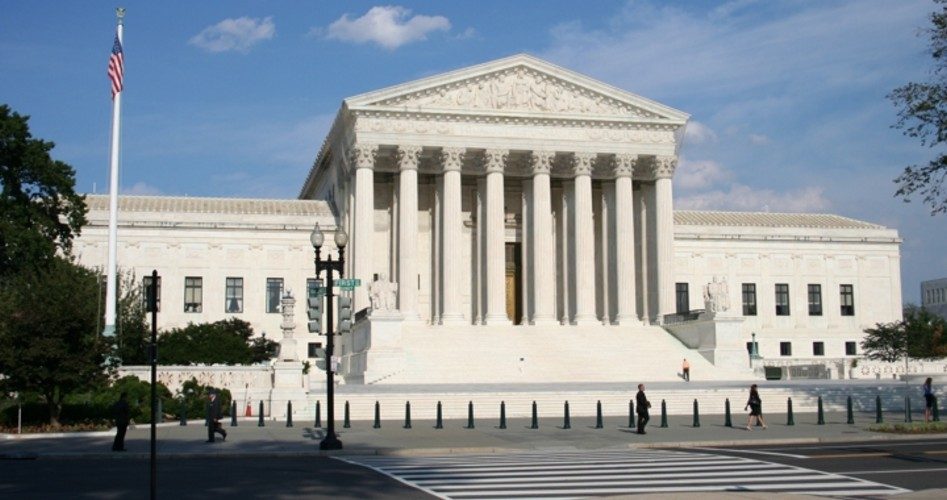
The U.S. Supreme Court is settling in this week to hear two cases that may yield landmark decisions in the battle for marriage. The first, which is underway today, will decide the constitutionality of California’s Proposition 8, the 2008 voter initiative that added an amendment to the state’s constitution defining marriage as only between a man and a woman. That case will be followed by a challenge to the 1996 federal Defense of Marriage Act (DOMA), which defines marriage as only between a man and a woman for the purposes of federal business.
California Gov. Jerry Brown has reneged on the state’s responsibility to defend Prop. 8, and while the amendment’s original sponsor, a California group called ProtectMarriage.com, has stepped forward to defend the measure before the High Court, opponents argue that the group does not have legal standing to do so.
Prop. 8 opponents insist that legal standing requires those arguing for the amendment to demonstrate that they would be harmed if same-sex couples were allowed to marry. “Proponents have never contended — and do not contend before this Court — that they would personally suffer any injury if gay men and lesbians were permitted to marry in California,” wrote attorneys Theodore Olson and David Boies, who are arguing the case on behalf of homosexual couples challenging Prop. 8. The attorneys contend that if the High Court finds ProtectMarriage.com does not have legal standing, then the amendment would automatically be voided and same-sex couples would be immediately able to marry in California.
By contrast, ProtectMarriage.com’s attorney, Charles Cooper, argued in papers submitted to the Supreme Court that the California Supreme Court gave his client the state’s authority to defend the law — a decision the U.S. Supreme Court is legally bound to honor.
In the case itself, homosexuals trying to overturn Prop. 8 and argue that denying same-sex couples the right to legally marry is akin to laws that once forbade interracial marriage — laws that were struck down in a 1967 Supreme Court decision. In arguing for same-sex couples, Olson and Boies wrote in court briefs that the “unmistakable purpose and effect of Proposition 8 is to stigmatize gay men and lesbians — and them alone — and enshrine in California’s Constitution that they are unequal to everyone else, that their committed relationships are ineligible for the designation ‘marriage’ and that they are unworthy of that most important relation in life.”
In defense of Prop. 8 Cooper wrote that marriage is “inextricably linked to the objective biological fact that opposite-sex couples and only such couples are capable of creating new life together and, therefore, are capable of furthering … society’s existential interests in responsible procreation and childbearing.” He argued that while marriage may serve “additional purposes,” as long as “responsible procreation remains one of the purposes of marriage” Prop. 8 must be allowed to stand. To the charge that the amendment is an attack against the civil rights of homosexuals, Cooper pointed out that Prop. 8 does not touch California’s generous domestic partnership laws that ensure for same-sex couples “some of the most comprehensive civil rights protections in the nation.”
The Associated Press noted that the Prop. 8 case is coming before the High Court 10 years to the day after the Court struck down a Texas law banning homosexual activity between consenting adults. “Justice Anthony Kennedy was the author of the decision in Lawrence v. Texas in 2003,” recalled AP, “and he is being closely watched for how he might vote on the California ban. He cautioned in the Lawrence case that it had nothing to do with gay marriage, but dissenting Justice Antonin Scalia predicted the decision would lead to the invalidation of state laws against same-sex marriage.”
The High Court has a number of options in how it may rule on the Prop. 8 case. “In addition to upholding the ban [or] invalidating prohibitions everywhere,” reported AP News, “the justices could endorse an appeals court ruling that would make same-sex marriage legal in California but apply only to that state. They also could issue a broader ruling that would apply to California and eight other states: Colorado, Delaware, Hawaii, Illinois, Nevada, New Jersey, Oregon and Rhode Island. In those states, gay couples may join in civil unions or become domestic partners and have all the benefits of marriage, but cannot be married.”
Prop. 8 landed in front of the Supreme Court after both a lower federal court, and then the Ninth Circuit Court of Appeals, ruled that the state constitutional amendment was unconstitutional. Chris Gacek, a senior fellow with the Family Research Council, said the best scenario would be for the High Court to “overturn the Ninth Circuit and basically say the people of California had a right to define marriage in their Constitution.”
Most pro-family leaders are hopeful that with regard to Prop. 8, the High Court will make a ruling that, for the time being at least, leaves the definition in the hands of individual states. Jason J. McGuire, president of the New Yorkers Family Research Foundation, said the Supreme Court would “do justice by recognizing that state laws and constitutional amendments setting forth a one-man, one-woman definition of marriage do not unconstitutionally discriminate against anyone. In reality, such laws and amendments merely describe what marriage is and leave individuals free to decide for themselves whether to enter into a marriage relationship or whether to make other relationship choices.”
Following arguments in the Prop. 8 case today, the Supreme Court is scheduled to hear arguments in the case challenging the federal DOMA law tomorrow. Decisions in both cases are not expected before late June.
Photo of U.S. Supreme Court building



